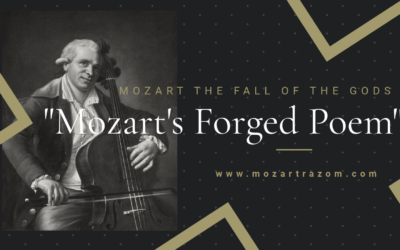Wolfgang Amadé Mozart
From London to Vienna: The Orchestrated Struggles of the Mozart Family
The Mozart family’s journey from London to Vienna was marked by illness, failed opportunities, and the relentless ambition of Leopold Mozart, revealing the pressures and challenges behind the facade of success.
Mozart in Italy: The Untold Story
Was Mozart truly a solitary genius, or was he merely the instrument of his father’s ambition? “Mozart in Italy” challenges the conventional narrative, revealing a complex dynamic between father and son that shaped the course of music history. Prepare to question everything you thought you knew.
“The struggles and setbacks they faced highlight the pressures placed on young Wolfgang and the lengths to which Leopold would go to achieve his goals”
Mozart in Italy
The tale of the Mozarts’ journey from London to Vienna is often recounted as a series of remarkable successes. However, when stripped of the embellishments and exaggerations propagated by Leopold Mozart, a more complex and challenging reality emerges. This journey was marked by illness, failed opportunities, and the relentless ambition of a father determined to craft a legacy for his son.
London: The Harsh Reality Behind the Curtain
In 1764, following their Parisian experience, the Mozart family crossed the English Channel to conquer London. Leopold, ever eager to prove the family’s worth to his friends in Salzburg, seized every opportunity to showcase his children, even in the pubs of London, while awaiting an audience at court. However, this triumphant display was abruptly halted when Leopold fell seriously ill in July, forcing the family into a prolonged stay in Chelsea. During this time, Wolfgang, then just eight years old, composed a series of simple, flawed pieces under the guidance of his sister. These compositions, often lauded as early signs of genius, are rife with errors and demonstrate the limitations of young Wolfgang’s abilities at that time.
The improvisations that Wolfgang and Nannerl performed across Europe, including London, were not spontaneous bursts of creativity, but rather rehearsed and structured pieces. These performances, meticulously planned by Leopold, aimed to impress audiences with flashy scales and arpeggios, but lacked memorable melodies and depth. The often-cited claim that Wolfgang had already mastered composition by this age is contradicted by these rudimentary works, which reveal the struggles and imperfections of a young, developing musician.
Vienna: A City of Missed Opportunities
The next significant chapter in the Mozarts’ travels was their journey to Vienna in 1767. This visit, like their time in London, was plagued by misfortune. The outbreak of smallpox, which claimed the life of Archduchess Maria Josepha of Austria, forced the cancellation of the children’s planned performances at court. Leopold, always seeking to maintain the momentum of his children’s careers, was left frustrated and desperate as Wolfgang fell seriously ill. It took months for him to recover, and by the time the family was able to return to Vienna in early 1768, the initial buzz surrounding the young prodigies had faded.
Wolfgang, though still marketable due to his youthful appearance, was no longer the child wonder who had astonished European audiences. Leopold, undeterred by the setbacks, decided it was time to transition his son from a performer to a composer, even pushing him to write an Italian opera for the Viennese stage. This ambitious plan was Leopold’s way of asserting his and Wolfgang’s capabilities, particularly in the eyes of their skeptics in Salzburg.
The Burden of Ambition
Throughout these travels, Leopold’s relentless ambition is evident. He was determined to elevate his son’s status and secure a place for him in the annals of history, often at the expense of the family’s well-being. The struggles and setbacks they faced in London and Vienna highlight the pressures placed on young Wolfgang and the lengths to which Leopold would go to achieve his goals.
You May Also Like
#3 Leopold Mozart’s Literary Theft
Hidden within the Mozarteum’s archives lies a poem that has long been hailed as a tribute to the young Mozart children. But behind this innocent façade is a story of deception, literary theft, and one father’s ambition to rewrite history.
#4 The Golden Spur
While often portrayed as a prestigious award, the Golden Spur (Speron d’Oro) granted to Mozart in 1770 was far from a reflection of his musical genius. In this article, we delve into the true story behind this now-forgotten honour, its loss of value, and the role of Leopold Mozart’s ambitions in securing it.
Mozart Unmasked: The Untold Story of His Italian Years
Explore the lesser-known side of Wolfgang Amadé Mozart’s early years in Italy. ‘Mozart in Italy’ unveils the complexities, controversies, and hidden truths behind his formative experiences, guided by meticulous research and rare historical documents. Delve into a story that challenges the traditional narrative and offers a fresh perspective on one of history’s most enigmatic composers.
Another Example of Borrowed Genius
The myth of Mozart’s genius continues to collapse under the weight of his reliance on others’ ideas, with Leopold orchestrating his son’s supposed early brilliance.
A Genius or a Patchwork?
The genius of Mozart had yet to bloom, despite the anecdotes passed down to us. These concertos were not the work of a prodigy, but a collaborative effort between father and son, built on the music of others.
Myth, Reality, and the Hand of Martini
Mozart handed over Martini’s Antiphon, not his own, avoiding what could have been an embarrassing failure. The young prodigy had a lot to learn, and much of what followed was myth-making at its finest.







